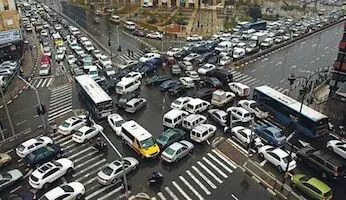Severe traffic congestion, where backed-up traffic blocks movement on intersecting roads and progress is completely halted.
Gridlock
What's the meaning of the word 'Gridlock'?
What's the origin of the word 'Gridlock'?
Okay, gridlock is a word, not a phrase. It’s included here as it is really two words squeezed into one, and because it has a quite interesting derivation. It is also something of a rarity in that, for once, the person claiming to have coined it appears to have a valid claim. The similarity of ‘grid’ and ‘grind’, as in ‘grind to a halt‘ must have had a bearing, but the term itself appears to have had a specific source.
There seems no better place than New York to have spawned this term. It has a grid-based road system and notoriously high levels of traffic. The story goes that Roy Cottam and Sam Schwartz (‘Gridlock Sam’), who worked for the New York Traffic Department as transport engineers, coined it during a strike by city transit workers in April 1980. In 2001, Schwartz claimed that:
“One day, Roy spoke of his fears if we closed the streets in the Theater District, the grid system would ‘lock-up’ and all traffic would grind to a halt. Soon we simply juxtaposed the word, and the term gridlock was born.”
They were right to be concerned. In May 1980, the US newspaper The Daily Press reported that a new word may have entered the language. Under the title of “A Striking New Word”, they printed this piece:
The Great New York City Transit Strike of 1980 has come and gone and possibly left behind something permanent. Emergency efforts focused on the intersections, keeping traffic moving through and avoiding blockages that would halt movement on streets feeding in. The feared worst case was a domino effect, blockage of one intersection rapidly spreading to others throughout the grid – hence gridlock. The term has apparently been in use for some time among traffic engineers. But the G&C Merriam Co., the dictionary people, says it does not appear in any of that authority’s dictionaries or reference files. As far as Merriam is concerned, the strike gave public currency to a totally new word. As a consequence, gridlock is going into the files and stands a very good chance of making it into the dictionary as part of everyday language.
Present-day research backs up Merriam’s findings. There are no examples of ‘gridlock’ in print prior to 1980, but many, in newspaper reports and elsewhere, dating from soon after the Transit Strike.
The history of “Gridlock” in printed materials
Trend of gridlock in printed material over time
Related phrases and meanings
Browse more Phrases
About the Author

Phrases & Meanings
A-Z
A B C D E F G H I J K L M N O P Q R S T UV W XYZ
Categories
American Animals Australian Bible Body Colour Conflict Death Devil Dogs Emotions Euphemism Family Fashion Food French Horses ‘Jack’ Luck Money Military Music Names Nature Nautical Numbers Politics Religion Shakespeare Stupidity Entertainment Weather Women Work
How did we do?
Have you spotted something that needs updated on this page? We review all feedback we receive to ensure that we provide the most accurate and up to date information on phrases.
